Business Environment Analysis: TUI Group's Challenges and Strategies
VerifiedAdded on 2023/06/09
|9
|2686
|332
Case Study
AI Summary
This case study provides an analysis of the business environment affecting TUI Group, a leading tourism company in the UK. It examines the internal and micro-environmental impacts of the COVID-19 pandemic, highlighting challenges such as decreased demand and sustainability issues. The study also assesses the influence of the UK government's recovery plan, including policies aimed at promoting tourism and providing financial support. Furthermore, it explores the effects of STEEPLE factors (Social, Technological, Economic, Environmental, Political, Legal, and Ethical) on TUI Group's operations, emphasizing the importance of understanding consumer preferences and adapting to technological changes. The analysis details how these factors influence TUI's strategic decisions and its ability to maintain competitiveness and sustainability in a dynamic market.
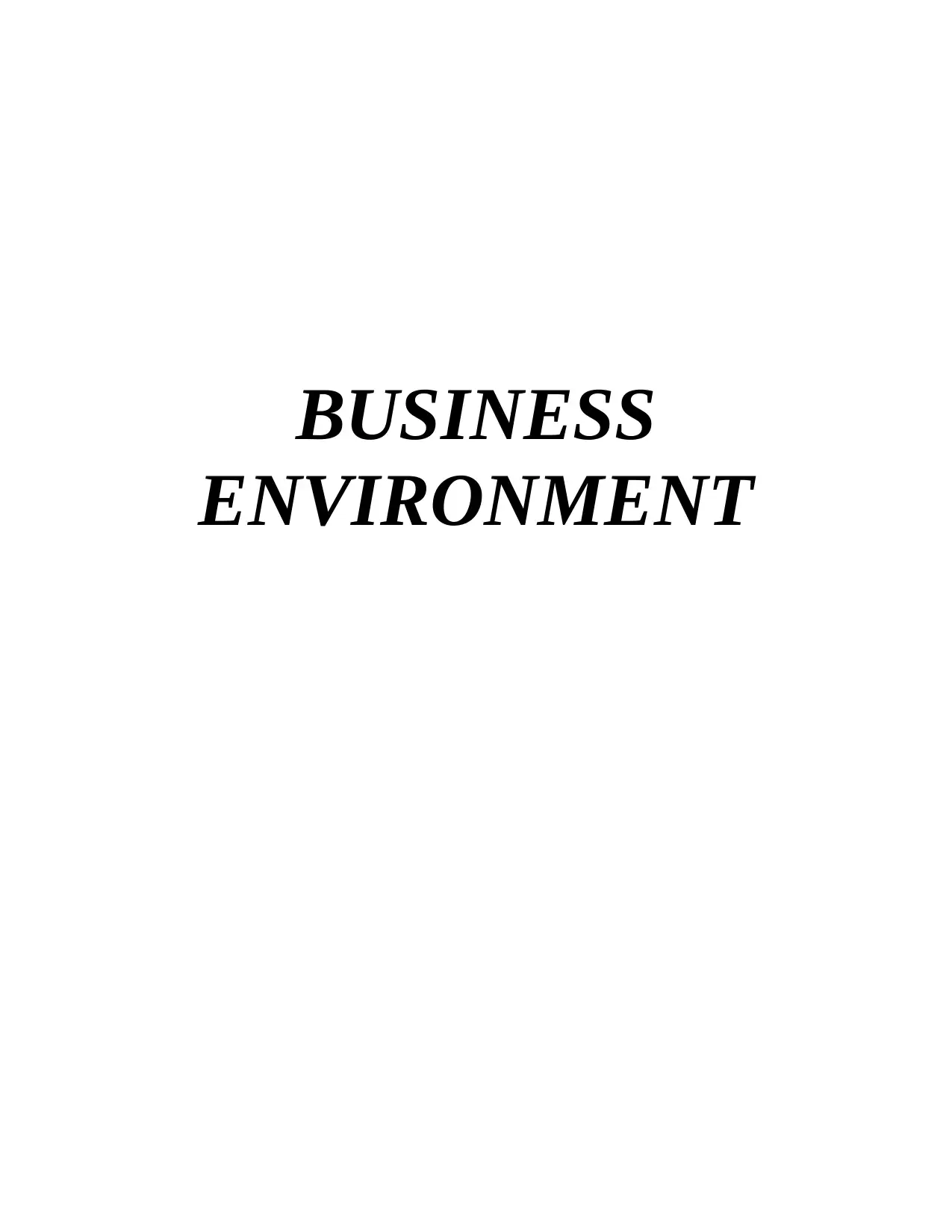
BUSINESS
ENVIRONMENT
ENVIRONMENT
Paraphrase This Document
Need a fresh take? Get an instant paraphrase of this document with our AI Paraphraser
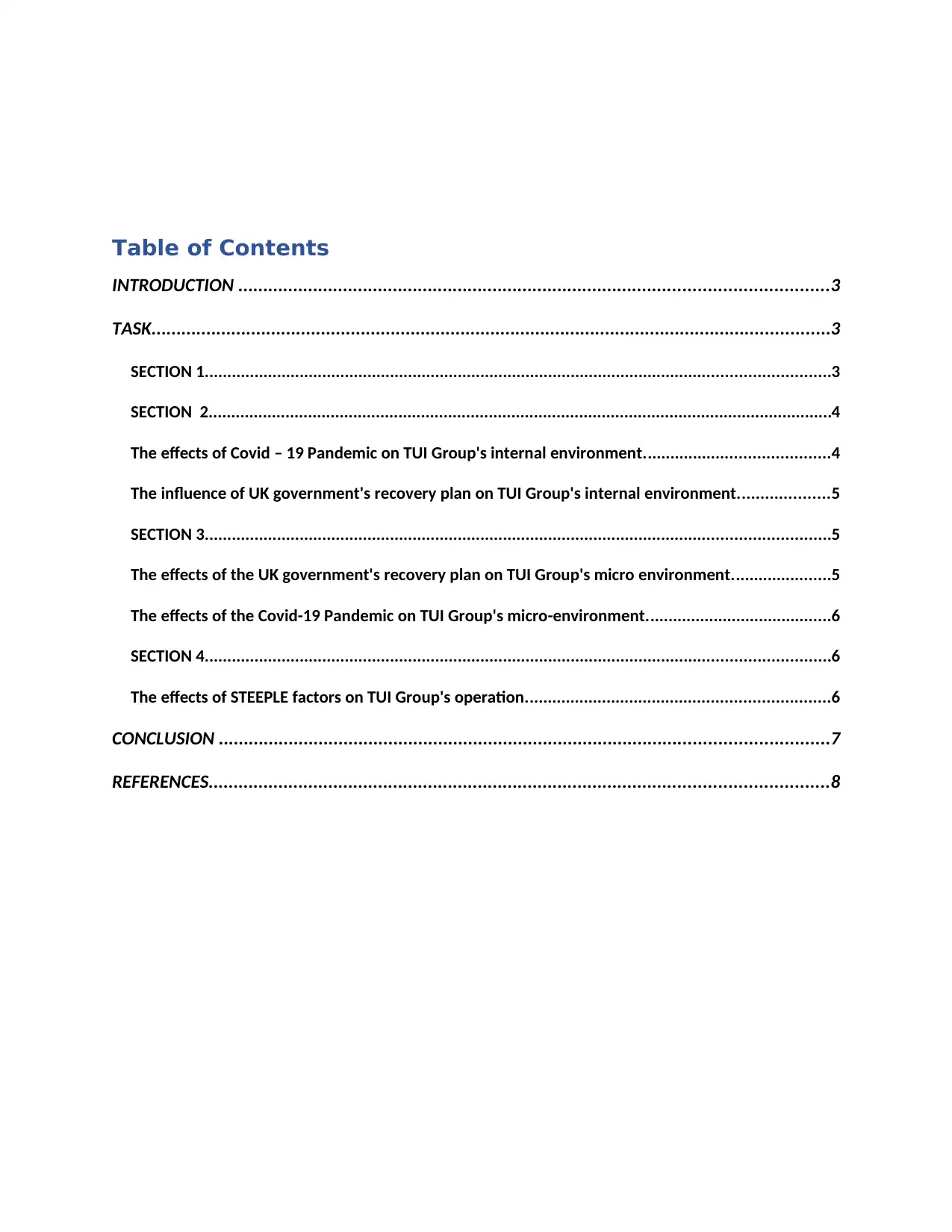
Table of Contents
INTRODUCTION ......................................................................................................................3
TASK........................................................................................................................................3
SECTION 1..........................................................................................................................................3
SECTION 2..........................................................................................................................................4
The effects of Covid – 19 Pandemic on TUI Group's internal environment.........................................4
The influence of UK government's recovery plan on TUI Group's internal environment....................5
SECTION 3..........................................................................................................................................5
The effects of the UK government's recovery plan on TUI Group's micro environment......................5
The effects of the Covid-19 Pandemic on TUI Group's micro-environment.........................................6
SECTION 4..........................................................................................................................................6
The effects of STEEPLE factors on TUI Group's operation...................................................................6
CONCLUSION ..........................................................................................................................7
REFERENCES............................................................................................................................8
INTRODUCTION ......................................................................................................................3
TASK........................................................................................................................................3
SECTION 1..........................................................................................................................................3
SECTION 2..........................................................................................................................................4
The effects of Covid – 19 Pandemic on TUI Group's internal environment.........................................4
The influence of UK government's recovery plan on TUI Group's internal environment....................5
SECTION 3..........................................................................................................................................5
The effects of the UK government's recovery plan on TUI Group's micro environment......................5
The effects of the Covid-19 Pandemic on TUI Group's micro-environment.........................................6
SECTION 4..........................................................................................................................................6
The effects of STEEPLE factors on TUI Group's operation...................................................................6
CONCLUSION ..........................................................................................................................7
REFERENCES............................................................................................................................8
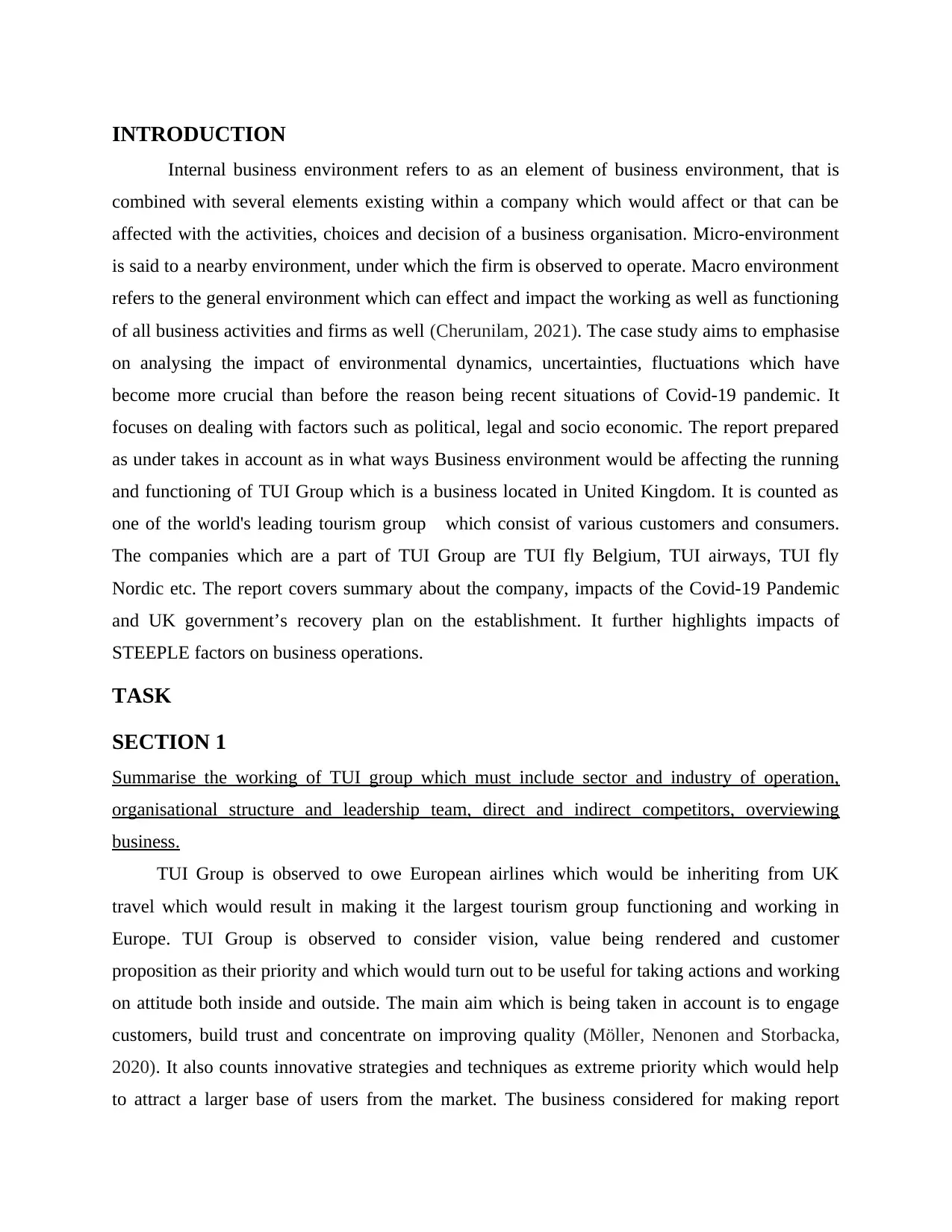
INTRODUCTION
Internal business environment refers to as an element of business environment, that is
combined with several elements existing within a company which would affect or that can be
affected with the activities, choices and decision of a business organisation. Micro-environment
is said to a nearby environment, under which the firm is observed to operate. Macro environment
refers to the general environment which can effect and impact the working as well as functioning
of all business activities and firms as well (Cherunilam, 2021). The case study aims to emphasise
on analysing the impact of environmental dynamics, uncertainties, fluctuations which have
become more crucial than before the reason being recent situations of Covid-19 pandemic. It
focuses on dealing with factors such as political, legal and socio economic. The report prepared
as under takes in account as in what ways Business environment would be affecting the running
and functioning of TUI Group which is a business located in United Kingdom. It is counted as
one of the world's leading tourism group which consist of various customers and consumers.
The companies which are a part of TUI Group are TUI fly Belgium, TUI airways, TUI fly
Nordic etc. The report covers summary about the company, impacts of the Covid-19 Pandemic
and UK government’s recovery plan on the establishment. It further highlights impacts of
STEEPLE factors on business operations.
TASK
SECTION 1
Summarise the working of TUI group which must include sector and industry of operation,
organisational structure and leadership team, direct and indirect competitors, overviewing
business.
TUI Group is observed to owe European airlines which would be inheriting from UK
travel which would result in making it the largest tourism group functioning and working in
Europe. TUI Group is observed to consider vision, value being rendered and customer
proposition as their priority and which would turn out to be useful for taking actions and working
on attitude both inside and outside. The main aim which is being taken in account is to engage
customers, build trust and concentrate on improving quality (Möller, Nenonen and Storbacka,
2020). It also counts innovative strategies and techniques as extreme priority which would help
to attract a larger base of users from the market. The business considered for making report
Internal business environment refers to as an element of business environment, that is
combined with several elements existing within a company which would affect or that can be
affected with the activities, choices and decision of a business organisation. Micro-environment
is said to a nearby environment, under which the firm is observed to operate. Macro environment
refers to the general environment which can effect and impact the working as well as functioning
of all business activities and firms as well (Cherunilam, 2021). The case study aims to emphasise
on analysing the impact of environmental dynamics, uncertainties, fluctuations which have
become more crucial than before the reason being recent situations of Covid-19 pandemic. It
focuses on dealing with factors such as political, legal and socio economic. The report prepared
as under takes in account as in what ways Business environment would be affecting the running
and functioning of TUI Group which is a business located in United Kingdom. It is counted as
one of the world's leading tourism group which consist of various customers and consumers.
The companies which are a part of TUI Group are TUI fly Belgium, TUI airways, TUI fly
Nordic etc. The report covers summary about the company, impacts of the Covid-19 Pandemic
and UK government’s recovery plan on the establishment. It further highlights impacts of
STEEPLE factors on business operations.
TASK
SECTION 1
Summarise the working of TUI group which must include sector and industry of operation,
organisational structure and leadership team, direct and indirect competitors, overviewing
business.
TUI Group is observed to owe European airlines which would be inheriting from UK
travel which would result in making it the largest tourism group functioning and working in
Europe. TUI Group is observed to consider vision, value being rendered and customer
proposition as their priority and which would turn out to be useful for taking actions and working
on attitude both inside and outside. The main aim which is being taken in account is to engage
customers, build trust and concentrate on improving quality (Möller, Nenonen and Storbacka,
2020). It also counts innovative strategies and techniques as extreme priority which would help
to attract a larger base of users from the market. The business considered for making report
⊘ This is a preview!⊘
Do you want full access?
Subscribe today to unlock all pages.

Trusted by 1+ million students worldwide
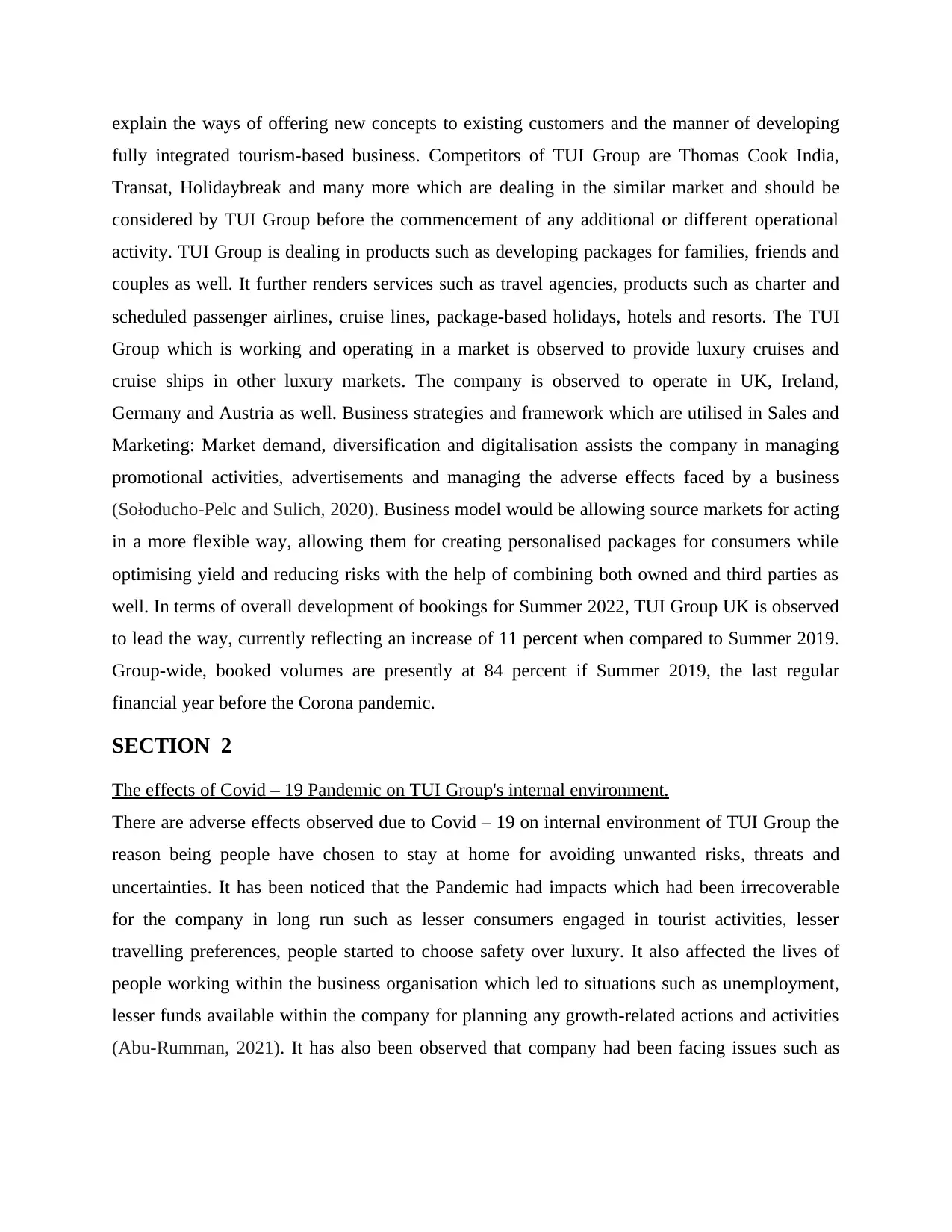
explain the ways of offering new concepts to existing customers and the manner of developing
fully integrated tourism-based business. Competitors of TUI Group are Thomas Cook India,
Transat, Holidaybreak and many more which are dealing in the similar market and should be
considered by TUI Group before the commencement of any additional or different operational
activity. TUI Group is dealing in products such as developing packages for families, friends and
couples as well. It further renders services such as travel agencies, products such as charter and
scheduled passenger airlines, cruise lines, package-based holidays, hotels and resorts. The TUI
Group which is working and operating in a market is observed to provide luxury cruises and
cruise ships in other luxury markets. The company is observed to operate in UK, Ireland,
Germany and Austria as well. Business strategies and framework which are utilised in Sales and
Marketing: Market demand, diversification and digitalisation assists the company in managing
promotional activities, advertisements and managing the adverse effects faced by a business
(Sołoducho-Pelc and Sulich, 2020). Business model would be allowing source markets for acting
in a more flexible way, allowing them for creating personalised packages for consumers while
optimising yield and reducing risks with the help of combining both owned and third parties as
well. In terms of overall development of bookings for Summer 2022, TUI Group UK is observed
to lead the way, currently reflecting an increase of 11 percent when compared to Summer 2019.
Group-wide, booked volumes are presently at 84 percent if Summer 2019, the last regular
financial year before the Corona pandemic.
SECTION 2
The effects of Covid – 19 Pandemic on TUI Group's internal environment.
There are adverse effects observed due to Covid – 19 on internal environment of TUI Group the
reason being people have chosen to stay at home for avoiding unwanted risks, threats and
uncertainties. It has been noticed that the Pandemic had impacts which had been irrecoverable
for the company in long run such as lesser consumers engaged in tourist activities, lesser
travelling preferences, people started to choose safety over luxury. It also affected the lives of
people working within the business organisation which led to situations such as unemployment,
lesser funds available within the company for planning any growth-related actions and activities
(Abu-Rumman, 2021). It has also been observed that company had been facing issues such as
fully integrated tourism-based business. Competitors of TUI Group are Thomas Cook India,
Transat, Holidaybreak and many more which are dealing in the similar market and should be
considered by TUI Group before the commencement of any additional or different operational
activity. TUI Group is dealing in products such as developing packages for families, friends and
couples as well. It further renders services such as travel agencies, products such as charter and
scheduled passenger airlines, cruise lines, package-based holidays, hotels and resorts. The TUI
Group which is working and operating in a market is observed to provide luxury cruises and
cruise ships in other luxury markets. The company is observed to operate in UK, Ireland,
Germany and Austria as well. Business strategies and framework which are utilised in Sales and
Marketing: Market demand, diversification and digitalisation assists the company in managing
promotional activities, advertisements and managing the adverse effects faced by a business
(Sołoducho-Pelc and Sulich, 2020). Business model would be allowing source markets for acting
in a more flexible way, allowing them for creating personalised packages for consumers while
optimising yield and reducing risks with the help of combining both owned and third parties as
well. In terms of overall development of bookings for Summer 2022, TUI Group UK is observed
to lead the way, currently reflecting an increase of 11 percent when compared to Summer 2019.
Group-wide, booked volumes are presently at 84 percent if Summer 2019, the last regular
financial year before the Corona pandemic.
SECTION 2
The effects of Covid – 19 Pandemic on TUI Group's internal environment.
There are adverse effects observed due to Covid – 19 on internal environment of TUI Group the
reason being people have chosen to stay at home for avoiding unwanted risks, threats and
uncertainties. It has been noticed that the Pandemic had impacts which had been irrecoverable
for the company in long run such as lesser consumers engaged in tourist activities, lesser
travelling preferences, people started to choose safety over luxury. It also affected the lives of
people working within the business organisation which led to situations such as unemployment,
lesser funds available within the company for planning any growth-related actions and activities
(Abu-Rumman, 2021). It has also been observed that company had been facing issues such as
Paraphrase This Document
Need a fresh take? Get an instant paraphrase of this document with our AI Paraphraser
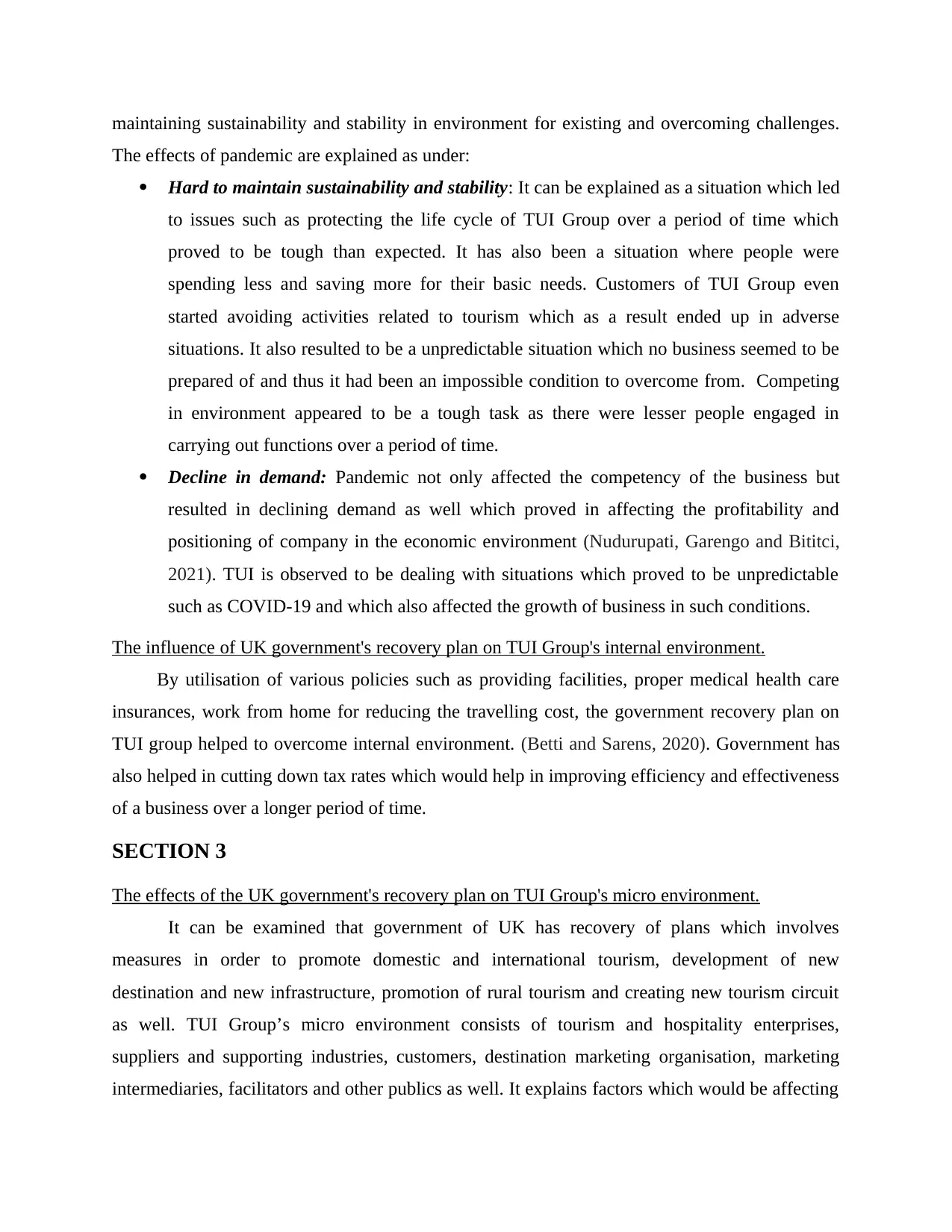
maintaining sustainability and stability in environment for existing and overcoming challenges.
The effects of pandemic are explained as under:
Hard to maintain sustainability and stability: It can be explained as a situation which led
to issues such as protecting the life cycle of TUI Group over a period of time which
proved to be tough than expected. It has also been a situation where people were
spending less and saving more for their basic needs. Customers of TUI Group even
started avoiding activities related to tourism which as a result ended up in adverse
situations. It also resulted to be a unpredictable situation which no business seemed to be
prepared of and thus it had been an impossible condition to overcome from. Competing
in environment appeared to be a tough task as there were lesser people engaged in
carrying out functions over a period of time.
Decline in demand: Pandemic not only affected the competency of the business but
resulted in declining demand as well which proved in affecting the profitability and
positioning of company in the economic environment (Nudurupati, Garengo and Bititci,
2021). TUI is observed to be dealing with situations which proved to be unpredictable
such as COVID-19 and which also affected the growth of business in such conditions.
The influence of UK government's recovery plan on TUI Group's internal environment.
By utilisation of various policies such as providing facilities, proper medical health care
insurances, work from home for reducing the travelling cost, the government recovery plan on
TUI group helped to overcome internal environment. (Betti and Sarens, 2020). Government has
also helped in cutting down tax rates which would help in improving efficiency and effectiveness
of a business over a longer period of time.
SECTION 3
The effects of the UK government's recovery plan on TUI Group's micro environment.
It can be examined that government of UK has recovery of plans which involves
measures in order to promote domestic and international tourism, development of new
destination and new infrastructure, promotion of rural tourism and creating new tourism circuit
as well. TUI Group’s micro environment consists of tourism and hospitality enterprises,
suppliers and supporting industries, customers, destination marketing organisation, marketing
intermediaries, facilitators and other publics as well. It explains factors which would be affecting
The effects of pandemic are explained as under:
Hard to maintain sustainability and stability: It can be explained as a situation which led
to issues such as protecting the life cycle of TUI Group over a period of time which
proved to be tough than expected. It has also been a situation where people were
spending less and saving more for their basic needs. Customers of TUI Group even
started avoiding activities related to tourism which as a result ended up in adverse
situations. It also resulted to be a unpredictable situation which no business seemed to be
prepared of and thus it had been an impossible condition to overcome from. Competing
in environment appeared to be a tough task as there were lesser people engaged in
carrying out functions over a period of time.
Decline in demand: Pandemic not only affected the competency of the business but
resulted in declining demand as well which proved in affecting the profitability and
positioning of company in the economic environment (Nudurupati, Garengo and Bititci,
2021). TUI is observed to be dealing with situations which proved to be unpredictable
such as COVID-19 and which also affected the growth of business in such conditions.
The influence of UK government's recovery plan on TUI Group's internal environment.
By utilisation of various policies such as providing facilities, proper medical health care
insurances, work from home for reducing the travelling cost, the government recovery plan on
TUI group helped to overcome internal environment. (Betti and Sarens, 2020). Government has
also helped in cutting down tax rates which would help in improving efficiency and effectiveness
of a business over a longer period of time.
SECTION 3
The effects of the UK government's recovery plan on TUI Group's micro environment.
It can be examined that government of UK has recovery of plans which involves
measures in order to promote domestic and international tourism, development of new
destination and new infrastructure, promotion of rural tourism and creating new tourism circuit
as well. TUI Group’s micro environment consists of tourism and hospitality enterprises,
suppliers and supporting industries, customers, destination marketing organisation, marketing
intermediaries, facilitators and other publics as well. It explains factors which would be affecting
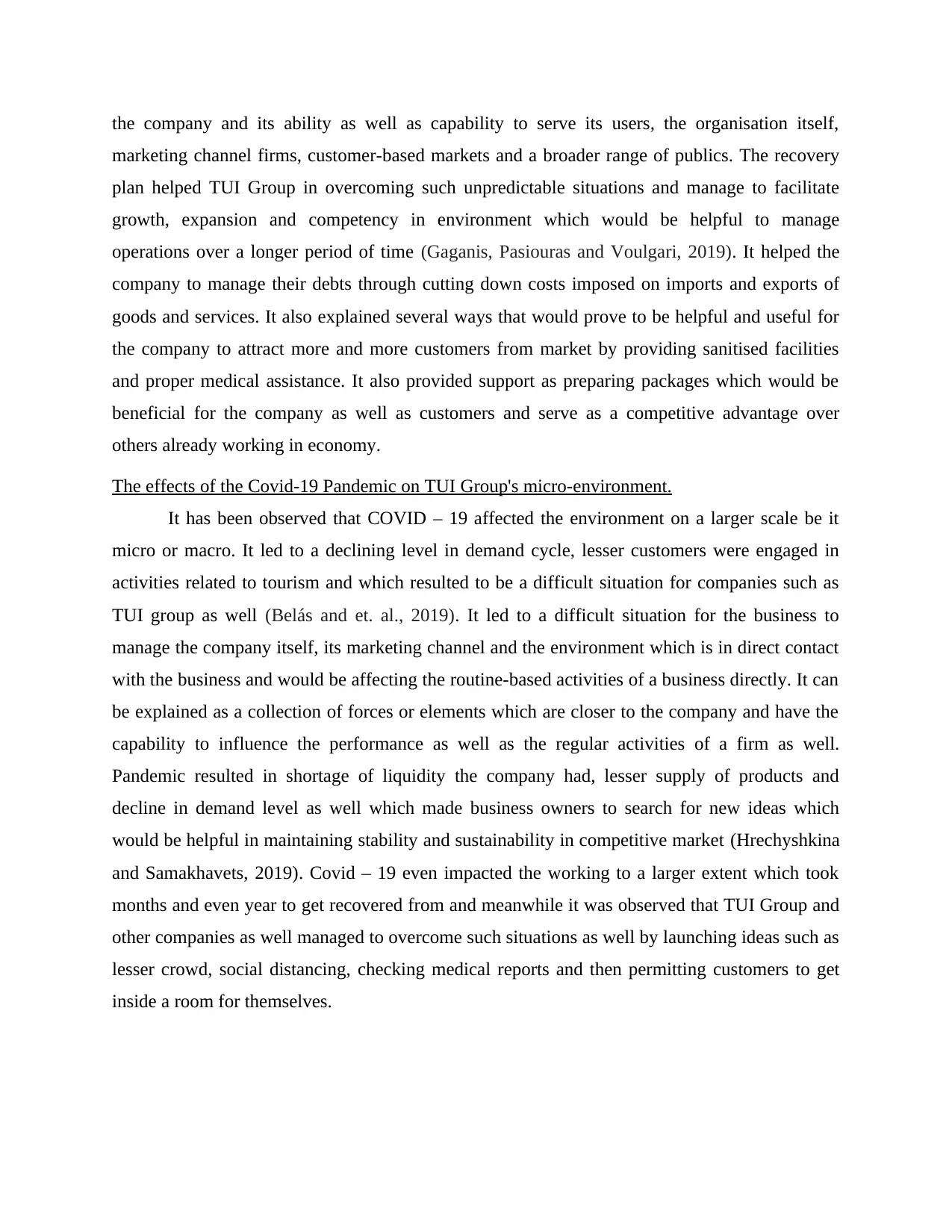
the company and its ability as well as capability to serve its users, the organisation itself,
marketing channel firms, customer-based markets and a broader range of publics. The recovery
plan helped TUI Group in overcoming such unpredictable situations and manage to facilitate
growth, expansion and competency in environment which would be helpful to manage
operations over a longer period of time (Gaganis, Pasiouras and Voulgari, 2019). It helped the
company to manage their debts through cutting down costs imposed on imports and exports of
goods and services. It also explained several ways that would prove to be helpful and useful for
the company to attract more and more customers from market by providing sanitised facilities
and proper medical assistance. It also provided support as preparing packages which would be
beneficial for the company as well as customers and serve as a competitive advantage over
others already working in economy.
The effects of the Covid-19 Pandemic on TUI Group's micro-environment.
It has been observed that COVID – 19 affected the environment on a larger scale be it
micro or macro. It led to a declining level in demand cycle, lesser customers were engaged in
activities related to tourism and which resulted to be a difficult situation for companies such as
TUI group as well (Belás and et. al., 2019). It led to a difficult situation for the business to
manage the company itself, its marketing channel and the environment which is in direct contact
with the business and would be affecting the routine-based activities of a business directly. It can
be explained as a collection of forces or elements which are closer to the company and have the
capability to influence the performance as well as the regular activities of a firm as well.
Pandemic resulted in shortage of liquidity the company had, lesser supply of products and
decline in demand level as well which made business owners to search for new ideas which
would be helpful in maintaining stability and sustainability in competitive market (Hrechyshkina
and Samakhavets, 2019). Covid – 19 even impacted the working to a larger extent which took
months and even year to get recovered from and meanwhile it was observed that TUI Group and
other companies as well managed to overcome such situations as well by launching ideas such as
lesser crowd, social distancing, checking medical reports and then permitting customers to get
inside a room for themselves.
marketing channel firms, customer-based markets and a broader range of publics. The recovery
plan helped TUI Group in overcoming such unpredictable situations and manage to facilitate
growth, expansion and competency in environment which would be helpful to manage
operations over a longer period of time (Gaganis, Pasiouras and Voulgari, 2019). It helped the
company to manage their debts through cutting down costs imposed on imports and exports of
goods and services. It also explained several ways that would prove to be helpful and useful for
the company to attract more and more customers from market by providing sanitised facilities
and proper medical assistance. It also provided support as preparing packages which would be
beneficial for the company as well as customers and serve as a competitive advantage over
others already working in economy.
The effects of the Covid-19 Pandemic on TUI Group's micro-environment.
It has been observed that COVID – 19 affected the environment on a larger scale be it
micro or macro. It led to a declining level in demand cycle, lesser customers were engaged in
activities related to tourism and which resulted to be a difficult situation for companies such as
TUI group as well (Belás and et. al., 2019). It led to a difficult situation for the business to
manage the company itself, its marketing channel and the environment which is in direct contact
with the business and would be affecting the routine-based activities of a business directly. It can
be explained as a collection of forces or elements which are closer to the company and have the
capability to influence the performance as well as the regular activities of a firm as well.
Pandemic resulted in shortage of liquidity the company had, lesser supply of products and
decline in demand level as well which made business owners to search for new ideas which
would be helpful in maintaining stability and sustainability in competitive market (Hrechyshkina
and Samakhavets, 2019). Covid – 19 even impacted the working to a larger extent which took
months and even year to get recovered from and meanwhile it was observed that TUI Group and
other companies as well managed to overcome such situations as well by launching ideas such as
lesser crowd, social distancing, checking medical reports and then permitting customers to get
inside a room for themselves.
⊘ This is a preview!⊘
Do you want full access?
Subscribe today to unlock all pages.

Trusted by 1+ million students worldwide
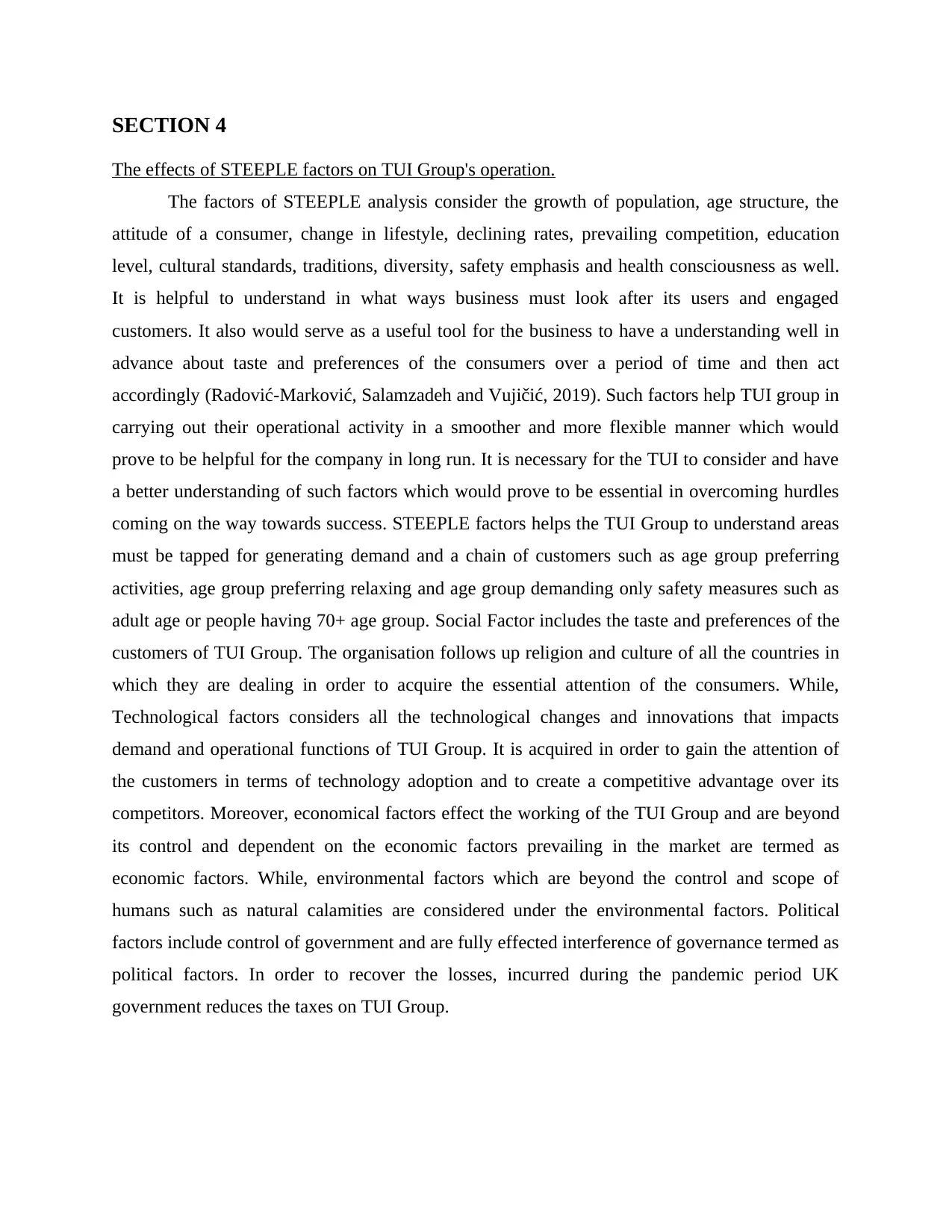
SECTION 4
The effects of STEEPLE factors on TUI Group's operation.
The factors of STEEPLE analysis consider the growth of population, age structure, the
attitude of a consumer, change in lifestyle, declining rates, prevailing competition, education
level, cultural standards, traditions, diversity, safety emphasis and health consciousness as well.
It is helpful to understand in what ways business must look after its users and engaged
customers. It also would serve as a useful tool for the business to have a understanding well in
advance about taste and preferences of the consumers over a period of time and then act
accordingly (Radović-Marković, Salamzadeh and Vujičić, 2019). Such factors help TUI group in
carrying out their operational activity in a smoother and more flexible manner which would
prove to be helpful for the company in long run. It is necessary for the TUI to consider and have
a better understanding of such factors which would prove to be essential in overcoming hurdles
coming on the way towards success. STEEPLE factors helps the TUI Group to understand areas
must be tapped for generating demand and a chain of customers such as age group preferring
activities, age group preferring relaxing and age group demanding only safety measures such as
adult age or people having 70+ age group. Social Factor includes the taste and preferences of the
customers of TUI Group. The organisation follows up religion and culture of all the countries in
which they are dealing in order to acquire the essential attention of the consumers. While,
Technological factors considers all the technological changes and innovations that impacts
demand and operational functions of TUI Group. It is acquired in order to gain the attention of
the customers in terms of technology adoption and to create a competitive advantage over its
competitors. Moreover, economical factors effect the working of the TUI Group and are beyond
its control and dependent on the economic factors prevailing in the market are termed as
economic factors. While, environmental factors which are beyond the control and scope of
humans such as natural calamities are considered under the environmental factors. Political
factors include control of government and are fully effected interference of governance termed as
political factors. In order to recover the losses, incurred during the pandemic period UK
government reduces the taxes on TUI Group.
The effects of STEEPLE factors on TUI Group's operation.
The factors of STEEPLE analysis consider the growth of population, age structure, the
attitude of a consumer, change in lifestyle, declining rates, prevailing competition, education
level, cultural standards, traditions, diversity, safety emphasis and health consciousness as well.
It is helpful to understand in what ways business must look after its users and engaged
customers. It also would serve as a useful tool for the business to have a understanding well in
advance about taste and preferences of the consumers over a period of time and then act
accordingly (Radović-Marković, Salamzadeh and Vujičić, 2019). Such factors help TUI group in
carrying out their operational activity in a smoother and more flexible manner which would
prove to be helpful for the company in long run. It is necessary for the TUI to consider and have
a better understanding of such factors which would prove to be essential in overcoming hurdles
coming on the way towards success. STEEPLE factors helps the TUI Group to understand areas
must be tapped for generating demand and a chain of customers such as age group preferring
activities, age group preferring relaxing and age group demanding only safety measures such as
adult age or people having 70+ age group. Social Factor includes the taste and preferences of the
customers of TUI Group. The organisation follows up religion and culture of all the countries in
which they are dealing in order to acquire the essential attention of the consumers. While,
Technological factors considers all the technological changes and innovations that impacts
demand and operational functions of TUI Group. It is acquired in order to gain the attention of
the customers in terms of technology adoption and to create a competitive advantage over its
competitors. Moreover, economical factors effect the working of the TUI Group and are beyond
its control and dependent on the economic factors prevailing in the market are termed as
economic factors. While, environmental factors which are beyond the control and scope of
humans such as natural calamities are considered under the environmental factors. Political
factors include control of government and are fully effected interference of governance termed as
political factors. In order to recover the losses, incurred during the pandemic period UK
government reduces the taxes on TUI Group.
Paraphrase This Document
Need a fresh take? Get an instant paraphrase of this document with our AI Paraphraser
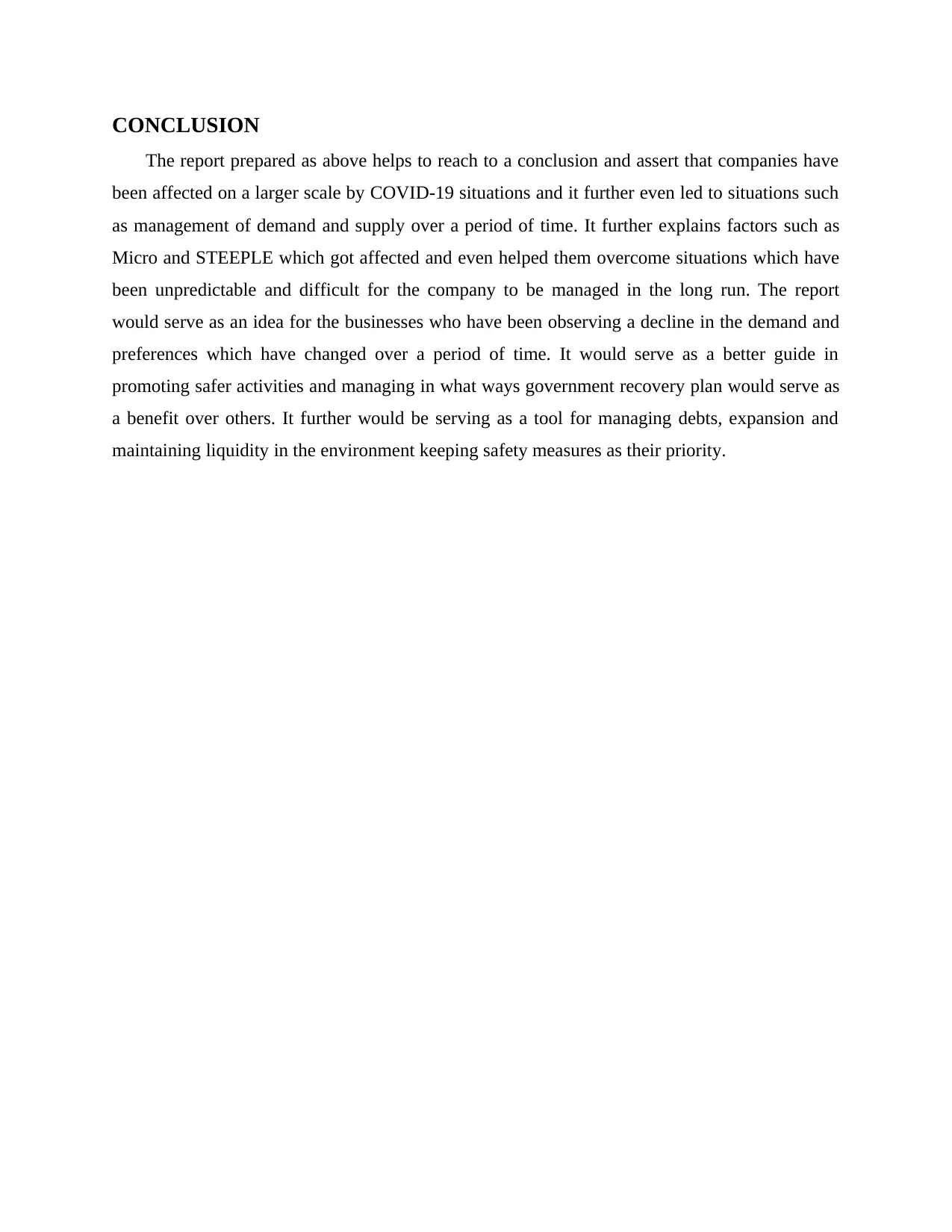
CONCLUSION
The report prepared as above helps to reach to a conclusion and assert that companies have
been affected on a larger scale by COVID-19 situations and it further even led to situations such
as management of demand and supply over a period of time. It further explains factors such as
Micro and STEEPLE which got affected and even helped them overcome situations which have
been unpredictable and difficult for the company to be managed in the long run. The report
would serve as an idea for the businesses who have been observing a decline in the demand and
preferences which have changed over a period of time. It would serve as a better guide in
promoting safer activities and managing in what ways government recovery plan would serve as
a benefit over others. It further would be serving as a tool for managing debts, expansion and
maintaining liquidity in the environment keeping safety measures as their priority.
The report prepared as above helps to reach to a conclusion and assert that companies have
been affected on a larger scale by COVID-19 situations and it further even led to situations such
as management of demand and supply over a period of time. It further explains factors such as
Micro and STEEPLE which got affected and even helped them overcome situations which have
been unpredictable and difficult for the company to be managed in the long run. The report
would serve as an idea for the businesses who have been observing a decline in the demand and
preferences which have changed over a period of time. It would serve as a better guide in
promoting safer activities and managing in what ways government recovery plan would serve as
a benefit over others. It further would be serving as a tool for managing debts, expansion and
maintaining liquidity in the environment keeping safety measures as their priority.
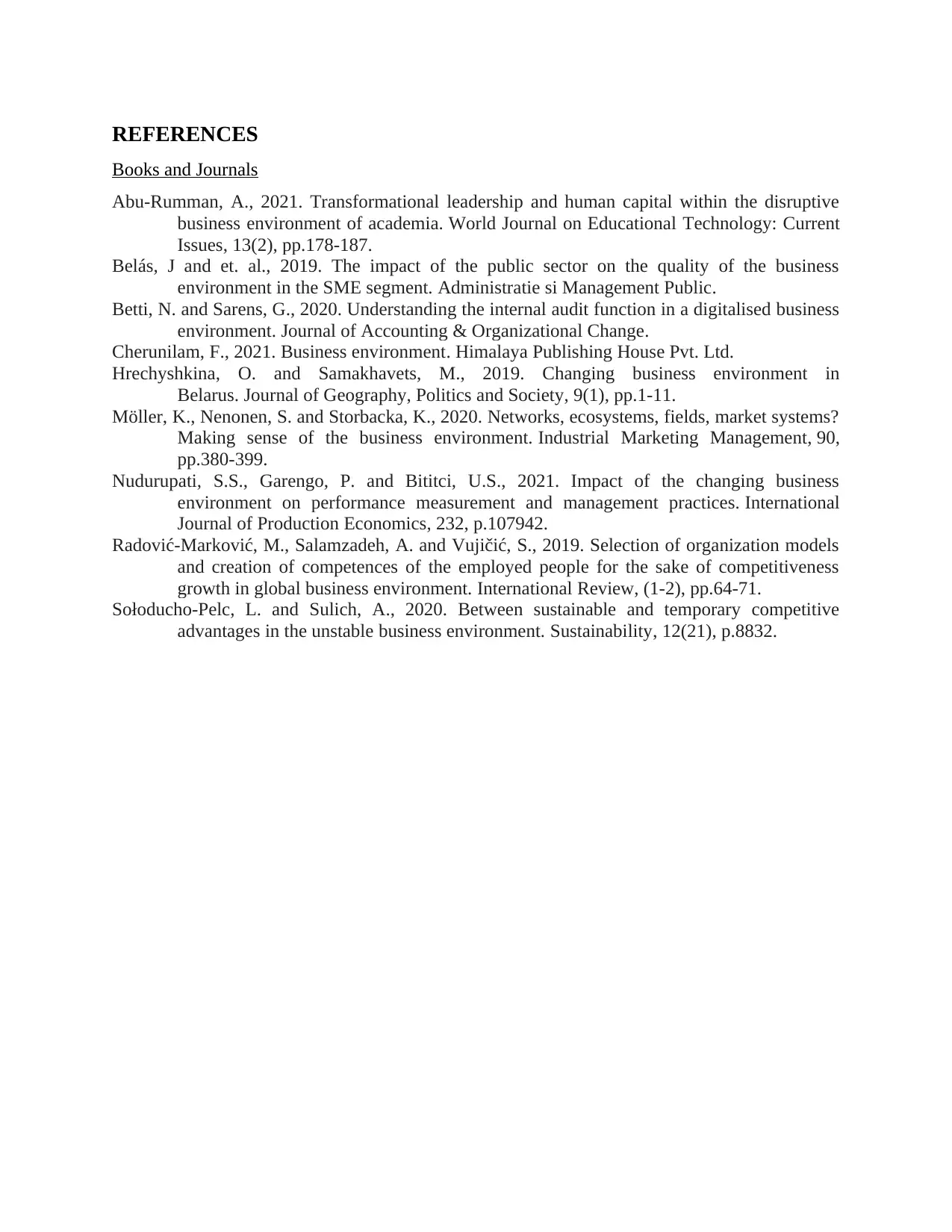
REFERENCES
Books and Journals
Abu-Rumman, A., 2021. Transformational leadership and human capital within the disruptive
business environment of academia. World Journal on Educational Technology: Current
Issues, 13(2), pp.178-187.
Belás, J and et. al., 2019. The impact of the public sector on the quality of the business
environment in the SME segment. Administratie si Management Public.
Betti, N. and Sarens, G., 2020. Understanding the internal audit function in a digitalised business
environment. Journal of Accounting & Organizational Change.
Cherunilam, F., 2021. Business environment. Himalaya Publishing House Pvt. Ltd.
Hrechyshkina, O. and Samakhavets, M., 2019. Changing business environment in
Belarus. Journal of Geography, Politics and Society, 9(1), pp.1-11.
Möller, K., Nenonen, S. and Storbacka, K., 2020. Networks, ecosystems, fields, market systems?
Making sense of the business environment. Industrial Marketing Management, 90,
pp.380-399.
Nudurupati, S.S., Garengo, P. and Bititci, U.S., 2021. Impact of the changing business
environment on performance measurement and management practices. International
Journal of Production Economics, 232, p.107942.
Radović-Marković, M., Salamzadeh, A. and Vujičić, S., 2019. Selection of organization models
and creation of competences of the employed people for the sake of competitiveness
growth in global business environment. International Review, (1-2), pp.64-71.
Sołoducho-Pelc, L. and Sulich, A., 2020. Between sustainable and temporary competitive
advantages in the unstable business environment. Sustainability, 12(21), p.8832.
Books and Journals
Abu-Rumman, A., 2021. Transformational leadership and human capital within the disruptive
business environment of academia. World Journal on Educational Technology: Current
Issues, 13(2), pp.178-187.
Belás, J and et. al., 2019. The impact of the public sector on the quality of the business
environment in the SME segment. Administratie si Management Public.
Betti, N. and Sarens, G., 2020. Understanding the internal audit function in a digitalised business
environment. Journal of Accounting & Organizational Change.
Cherunilam, F., 2021. Business environment. Himalaya Publishing House Pvt. Ltd.
Hrechyshkina, O. and Samakhavets, M., 2019. Changing business environment in
Belarus. Journal of Geography, Politics and Society, 9(1), pp.1-11.
Möller, K., Nenonen, S. and Storbacka, K., 2020. Networks, ecosystems, fields, market systems?
Making sense of the business environment. Industrial Marketing Management, 90,
pp.380-399.
Nudurupati, S.S., Garengo, P. and Bititci, U.S., 2021. Impact of the changing business
environment on performance measurement and management practices. International
Journal of Production Economics, 232, p.107942.
Radović-Marković, M., Salamzadeh, A. and Vujičić, S., 2019. Selection of organization models
and creation of competences of the employed people for the sake of competitiveness
growth in global business environment. International Review, (1-2), pp.64-71.
Sołoducho-Pelc, L. and Sulich, A., 2020. Between sustainable and temporary competitive
advantages in the unstable business environment. Sustainability, 12(21), p.8832.
⊘ This is a preview!⊘
Do you want full access?
Subscribe today to unlock all pages.

Trusted by 1+ million students worldwide
1 out of 9
Related Documents
Your All-in-One AI-Powered Toolkit for Academic Success.
+13062052269
info@desklib.com
Available 24*7 on WhatsApp / Email
![[object Object]](/_next/static/media/star-bottom.7253800d.svg)
Unlock your academic potential
Copyright © 2020–2026 A2Z Services. All Rights Reserved. Developed and managed by ZUCOL.




